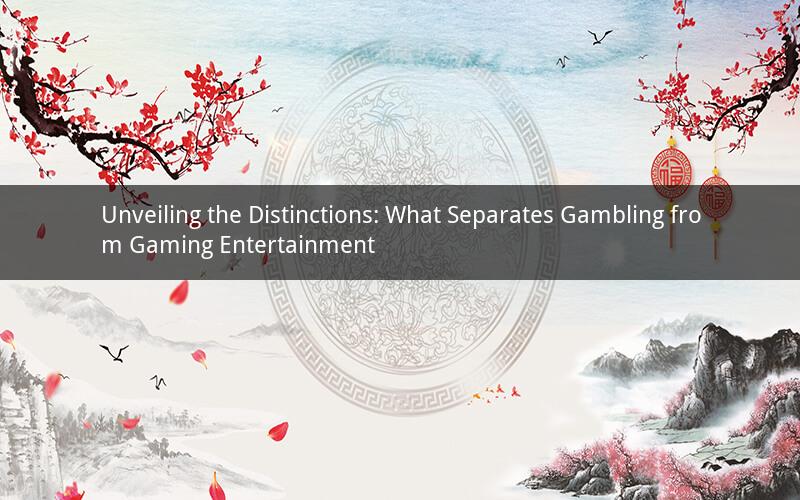
Gambling and gaming entertainment are two distinct activities that often blur the lines due to their similarities. Both involve the use of technology, money, and a level of risk, yet they serve different purposes and carry different implications. In this article, we will explore the key differences between gambling and gaming entertainment, highlighting their unique characteristics and the impact they have on individuals and society.
1. Purpose and Motivation
Gambling is primarily driven by the desire to win money, while gaming entertainment is focused on providing enjoyment and escapism. Gamblers are often motivated by the potential financial gains, whereas gamers seek entertainment and the thrill of competition or adventure.
2. Legal and Ethical Considerations
Gambling is regulated in many countries due to its potential for addiction and the negative consequences it can have on individuals and society. Governments impose strict laws and regulations to ensure fair play, prevent fraud, and protect vulnerable individuals. On the other hand, gaming entertainment is generally not subject to the same level of regulation, as it is considered a form of entertainment rather than a financial activity.
3. Risk and Reward
Gambling involves a higher level of risk compared to gaming entertainment. Gamblers can lose significant amounts of money, and the odds of winning are often stacked against them. In contrast, gaming entertainment typically offers a more balanced risk-to-reward ratio, with players having a chance to win rewards such as in-game items or virtual currency.
4. Social Interaction
Gambling often involves social interaction, as individuals gather in casinos or online platforms to participate in games of chance. This social aspect can be both positive and negative, as it can lead to the formation of communities or, in some cases, gambling-related problems. Gaming entertainment, on the other hand, can also provide opportunities for social interaction through multiplayer games or online communities, but it is not primarily driven by the social element.
5. Impact on Mental Health
Both gambling and gaming entertainment can have an impact on mental health, but the nature of this impact differs. Problem gambling can lead to addiction, depression, anxiety, and other mental health issues. In contrast, gaming entertainment can provide a positive escape from reality, improve cognitive skills, and foster social connections. However, excessive gaming can also lead to negative consequences, such as addiction or social isolation.
6. Skill and Strategy
Gambling is primarily based on luck, with players relying on chance to win. In contrast, gaming entertainment often requires a certain level of skill and strategy to succeed. While some games may involve random elements, many require players to develop skills such as problem-solving, strategy, and coordination.
7. Financial Implications
Gambling can have significant financial implications, both for individuals and society. Problem gambling can lead to financial ruin, debt, and even bankruptcy. In contrast, gaming entertainment is generally considered a form of entertainment and does not carry the same level of financial risk.
8. Cultural and Historical Context
Gambling has a long and complex history, with various forms of gambling existing in different cultures throughout history. It has been both a source of entertainment and a means of livelihood for many. Gaming entertainment, while also having a rich history, has evolved rapidly with advancements in technology, making it more accessible and widespread.
In conclusion, the key differences between gambling and gaming entertainment lie in their purposes, motivations, legal and ethical considerations, risk and reward, social interaction, impact on mental health, skill and strategy, financial implications, and cultural and historical context. While both activities involve risk and can be entertaining, they serve different purposes and carry different implications for individuals and society.
Questions and Answers:
1. Q: Can gaming entertainment become addictive?
A: Yes, gaming entertainment can become addictive, especially if individuals spend excessive amounts of time playing or prioritize gaming over other aspects of their lives.
2. Q: Is gambling always a form of entertainment?
A: No, gambling can have negative consequences and can lead to addiction, making it more than just a form of entertainment for some individuals.
3. Q: Can gaming entertainment help improve cognitive skills?
A: Yes, gaming entertainment can help improve cognitive skills such as problem-solving, strategy, and coordination, especially in games that require these abilities.
4. Q: Is problem gambling more prevalent in gaming entertainment than in gambling?
A: Problem gambling is more prevalent in gambling than in gaming entertainment, as gambling involves real money and has a higher potential for financial loss.
5. Q: How can individuals differentiate between responsible gaming and problem gambling?
A: Individuals can differentiate between responsible gaming and problem gambling by assessing their gaming habits, setting limits, and seeking help if they feel their gaming is negatively impacting their life. Responsible gamers prioritize real-life responsibilities and maintain a healthy balance between gaming and other aspects of their lives.